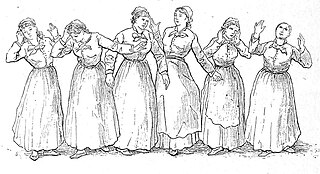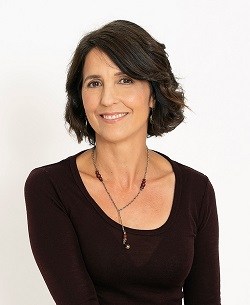
Endometriosis is a disease of the female reproductive system in which cells similar to those in the endometrium, the layer of tissue that normally covers the inside of the uterus, grow outside the uterus. Most often this is on the ovaries, fallopian tubes, and tissue around the uterus and ovaries; however, in rare cases it may also occur in other parts of the body. Some symptoms include pelvic pain, heavy periods, pain with bowel movements, and infertility. Nearly half of those affected have chronic pelvic pain, while in 70% pain occurs during menstruation. Pain during sexual intercourse is also common. Infertility occurs in up to half of affected individuals. About 25% of individuals have no symptoms and 85% of those seen with infertility in a tertiary center have no pain. Endometriosis can have both social and psychological effects.
Histrionic personality disorder (HPD) is defined by the American Psychiatric Association as a personality disorder characterized by a pattern of excessive attention-seeking behaviors, usually beginning in early childhood, including inappropriate seduction and an excessive desire for approval. People diagnosed with the disorder are said to be lively, dramatic, vivacious, enthusiastic, extroverted and flirtatious.

Hysteria is a term used colloquially to mean ungovernable emotional excess and can refer to a temporary state of mind or emotion. In the 19th century, hysteria was considered a diagnosable physical illness in women. It is assumed that the basis for diagnosis operated under the belief that women are predisposed to mental and behavioral conditions; an interpretation of sex-related differences in stress responses. In the 20th century, it shifted to being considered a mental illness. Many influential people such as Sigmund Freud and Jean-Martin Charcot dedicated research to hysteria patients.
Dyspareunia is painful sexual intercourse due to medical or psychological causes. The term dyspareunia covers both female dyspareunia and male dyspareunia, but many discussions that use the term without further specification concern the female type, which is more common than the male type. In females, the pain can primarily be on the external surface of the genitalia, or deeper in the pelvis upon deep pressure against the cervix. Medically, dyspareunia is a pelvic floor dysfunction and affects up to 53% of adult females at some point in their lives, although it is frequently underdiagnosed. It can affect a small portion of the vulva or vagina or be felt all over the surface. Understanding the duration, location, and nature of the pain is important in identifying the causes of the pain.

Conversion disorder (CD), or functional neurologic symptom disorder, is a diagnostic category used in some psychiatric classification systems. It is sometimes applied to patients who present with neurological symptoms, such as numbness, blindness, paralysis, or fits, which are not consistent with a well-established organic cause, which cause significant distress, and can be traced back to a psychological trigger. It is thought that these symptoms arise in response to stressful situations affecting a patient's mental health or an ongoing mental health condition such as depression. Conversion disorder was retained in DSM-5, but given the subtitle functional neurological symptom disorder. The new criteria cover the same range of symptoms, but remove the requirements for a psychological stressor to be present and for feigning to be disproved. ICD-10 classifies conversion disorder as a dissociative disorder while DSM-IV classifies it as a somatoform disorder.

Adenomyosis is a medical condition characterized by the growth of cells that build up the inside of the uterus (endometrium) atypically located within the cells that put up the uterine wall (myometrium), as a result, thickening of the uterus occurs. As well as being misplaced in patients with this condition, endometrial tissue is completely functional. The tissue thickens, sheds and bleeds during every menstrual cycle.

Female hysteria was once a common medical diagnosis for women, which was described as exhibiting a wide array of symptoms, including anxiety, shortness of breath, fainting, nervousness, sexual desire, insomnia, fluid retention, heaviness in the abdomen, irritability, loss of appetite for food or sex, (paradoxically) sexually forward behaviour, and a "tendency to cause trouble for others". It is no longer recognized by medical authorities as a medical disorder. Its diagnosis and treatment were routine for hundreds of years in Western Europe.

Pelvic pain is pain in the area of the pelvis. Acute pain is more common than chronic pain. If the pain lasts for more than six months, it is deemed to be chronic pelvic pain. It can affect both the male and female pelvis.

Endometrioma is the presence of endometrial tissue in and sometimes on the ovary. It is the most common form of endometriosis. Endometrioma is found in 17–44% patients with endometriosis. More broadly, endometriosis is the presence of endometrial tissue located outside the uterus. The presence of endometriosis can result in the formation of scar tissue, adhesions and an inflammatory reaction. It usually is a benign growth. An endometrioma is most often found in the ovary. This ovarian endometriosis forms dark, fluid-filled cysts. These fluid-filled sacs can vary greatly in size and are known as endometriomas, also called "chocolate cysts". The fluid inside the cysts is thick, dark, old blood, giving it a chocolate-like appearance. It can also develop in the cul-de-sac, the surface of the uterus, and between the vagina and rectum.

Harriet A. Hall is a U.S. retired family physician, former U.S. Air Force flight surgeon and skeptic who writes about alternative medicine and quackery for Skeptic and Skeptical Inquirer. She writes under the name The SkepDoc.
Round ligament pain (RLP) is pain associated with the round ligament of the uterus, usually during pregnancy. RLP is one of the most common discomforts of pregnancy and usually starts at the second trimester of gestation and continues until delivery. It usually resolves completely after delivery although cases of postpartum RLP have been reported. RLP also occurs in nonpregnant women.

Pelvic congestion syndrome, also known as pelvic vein incompetence, is a long term condition believed to be due to enlarged veins in the lower abdomen. The condition may cause chronic pain, such as a constant dull ache, which can be worsened by standing or sex. Pain in the legs or lower back may also occur.

Abby Rosmarin is a model and writer. She is the author of Amazon bestseller The Ballerina's Guide to Boxing, as well as The Secret to a Happy Marriage, In the Event the Flower Girl Explodes, Chick Lit , I'm Just Here for the Free Scrutiny, and No One Reads Poetry: A Collection of Poems. She is also known for the viral essay "To The Women Who Choose Not to Have Children". Her work has appeared in The Huffington Post, xoJane, MindBodyGreen, Elite Daily, HelloGiggles, Thought Catalog, Elephant Journal, Bustle, and others.
During the era of National Socialism in Germany the discrimination towards the "Hereditarly Diseased" was at its peak. Racial hygiene was a big concern and the intent to fix it made Germany take extreme measures. People who were deaf and hard-of-hearing and all of the disabled were considered a "social burden". Adolf Hitler and many others feared that deafness was a hereditary gene that could be passed on from mother or father to the child. Germany's main solution to decrease the numbers was through sterilization.

Abby Lea Finkenauer is an American politician who served as the U.S. representative for Iowa's 1st congressional district from 2019 to 2021. A member of the Democratic Party, Finkenauer is seeking the Democratic Party's nomination for the U.S. Senate in 2022.

Ijeoma Oluo is an American writer. She is the author of So You Want to Talk About Race and has written for The Guardian,Jezebel, The Stranger, Medium, and The Establishment, where she was also an editor-at-large.

Endometriosis Society of India is a voluntary non-profit organisation that works to create awareness about endometriosis, training caregivers and service providers for better management of the condition and promoting research about endometriosis. Endometriosis is a benign yet progressive disease where the tissue that normally grows within the uterus grows outside of it – like on the ovaries, fallopian tubes or the external uterus. Its main symptoms are pelvic pain and infertility.

Lara Briden is a naturopathic doctor, women’s health speaker, and author of the books Period Repair Manual and Hormone Repair Manual, published by Pan Macmillan. She has consulting rooms in Christchurch, New Zealand, and travels widely to speak on women’s health.
The Endometriosis Foundation of America, Inc. is a non-profit organization dedicated to advancing awareness, promoting education and sponsoring research of endometriosis. EndoFound’s fourteen-member board of directors, as of 2020, includes patients, scientists, and physicians. It has a staff of eight as of 2020, and reported $1,359,233 revenues and $759,941 expenses in 2018. The society has its headquarters in New York, NY.
Pain and Prejudice: How the Medical System Ignores Women and What We Can Do About It is a 2019 non-fiction book by Gabrielle Jackson. The book chronicles Jackson's experiences living with endometriosis and adenomyosis and tracks a history of women's health care, specifically in relation to pain. The book was originally published in the UK and Australia under the title Pain and Prejudice: A Call to Arms for Women and Their Bodies.














